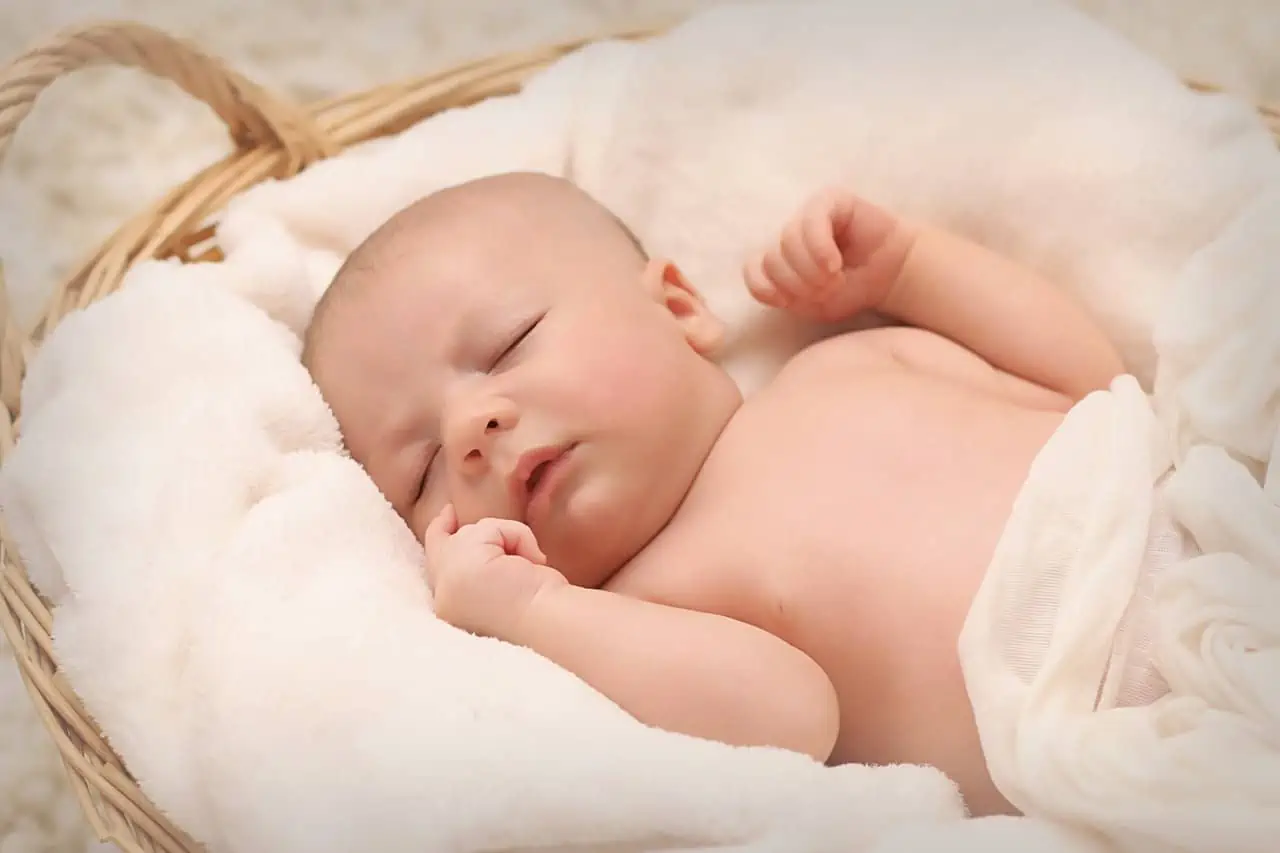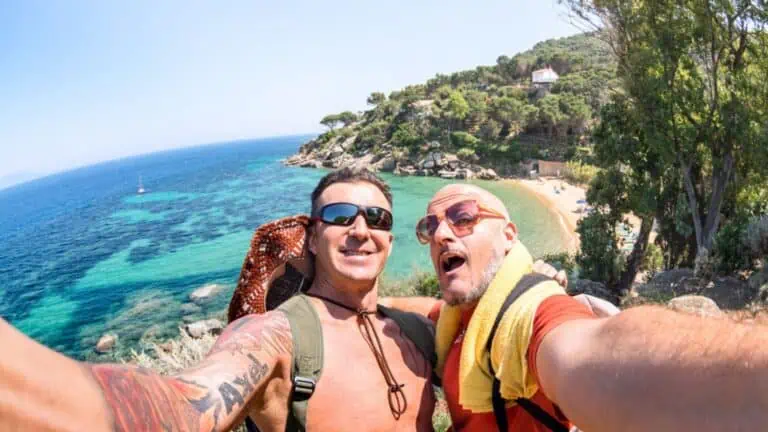How to Sleep Better on Vacation: Family Edition
This post may contain affiliate links. As an Amazon Associate, I earn from qualifying purchases.
For many people, there’s something about a vacation that helps them turn off their everyday busy life and sleep like a baby. However, getting a good night’s sleep may be more complicated if you’re hopping across time zones or traveling with kids (particularly babies). And there’s nothing like sleep deprivation to ruin a planned trip.
With a few strategies in place, you can learn how to sleep better on vacation so you can focus on enjoying yourself to the fullest. Keep reading to learn these tips.
Reasons Our Sleep Patterns Can Go Haywire When Traveling (And Why It Matters)
According to Harvard Medical School and the National Sleep Foundation, getting enough sleep is important for chronic disease prevention and overall health. If you travel a lot, the changing environment can cause sleep problems. There are several reasons our sleep may suffer when traveling, keeping us from getting a good night’s rest.
Jet Lag
First, jet lag can throw off our biological clock – whether you adjust your time by 1 or 12 hours. Traveling eastward causes the most jet lag trouble with daytime fatigue and nighttime insomnia – due to advanced circadian rhythms. Conversely, going westward delays one’s body clock and often results in trouble falling asleep at night.
Yes, even a 1-hour change can affect sleep quality, especially for little bodies. Most of us experience this twice a year with daylight savings time!
Routine Disruption
Second, sleeping in unfamiliar environments can cause a disruption. Hotel rooms may not be as quiet or dark as our homes, and the changes in temperature, sound, light, and air quality can all affect our sleep.
A Busy Mind
Lastly, the excitement of being in a new place (or going home for the holidays) can keep our minds alert at night and lead to poor sleep quality.
How to Sleep Better When Traveling (How to Beat Jet Lag)
Let’s review strategies for getting better nighttime sleep. If you have little ones, these can also help them get in their daytime naps. Which option you will implement first depends on what time of day you arrive at your destination.
Reset Your Internal Clock with Sunlight
Bright light exposure, especially daily sunlight exposure, helps reset our biological clock. If you arrive in the morning, get outside and expose yourself to as much sunlight as possible.
Natural light helps regulate melatonin and cortisol production (essential for helping us sleep) and sets the body’s clock. If you are limited in this option, consider bringing your own light lamp to help with this.
On the other hand, if you land at night or in the evening, stay away from bright lights and screens for a few hours before bed.
Get into a Routine
Our bodies love routine and familiarity, so it helps to stick to one as much as possible. Our schedules get thrown off when we travel, affecting our sleep cycles. To prevent this, create an itinerary that allows for plenty of downtime and regular naps (if applicable).
Try to also get into a regular sleep routine as soon as you arrive at your destination. Go to bed and wake up at the same time each day, even on weekends or when sightseeing. This consistency helps keep our circadian rhythms in check. It may seem “strict” for a vacation. Still, it’ll help everyone enjoy their trip with fewer changes or meltdowns (adults included).
Avoid Blue Light Close to Bedtime
Blue lights from cell phones, TVs, computers, and other electronic devices can disrupt melatonin production and make it harder to fall asleep at night. It’s best to avoid exposure to this light in the evening before bedtime.
Turn off all devices at least 30 minutes before bedtime (ideally sixty or more) to give yourself time to unwind and explore your new destination.
You may also want to install a free blue-light filter on your devices or wear blue-light-blocking glasses. This will help reduce the artificial light your eyes absorb close to bedtime.
Get Your Body Moving
Getting physical activity during the day can help improve sleep quality. Exercise helps our body produce endorphins, which make us feel good and relaxed. Set a goal for 20 to 30 minutes of exercise every day – going for a walk or stretching on the beach counts!
Great vacation-worthy exercise ideas include yoga, swimming, hiking, kayaking, biking, and dancing.
Eat and Drink Well
What we eat and drink can also affect our sleep. Maintaining a balanced diet while traveling is essential for good sleep habits, as it’ll help regulate our energy levels and sleep-wake cycle. Avoid overeating or eating heavy meals late at night, as this can cause indigestion and make it harder to fall asleep.
Drinking enough water is also essential, as dehydration can interrupt our sleep. But you should limit your alcohol and caffeine intake to the earlier part of the day, as these liquids can interfere with restful sleep at night.
Establish a Nighttime Routine
Creating a relaxing nighttime routine can signal your body that it’s time for bed. Try a few of these ideas that encourage good sleep habits:
- Taking a warm bath or shower
- Go for a stroll
- Listen to calming music or read a book
- Enjoy a cup of herbal tea (decaffeinated)
- Write in your journal about your adventures and thoughts
- Deep breathing
- Doing a final body scan when lying down in bed
- Progressive muscle relaxation
- Conversation with your partner, family, friend, or whomever you’re with
Set Up Your Sleep Environment
Choose a hotel or sleeping arrangement that is comfortable and conducive to sleep. Ensure the room temperature is comfortable (around 60-75 degrees depending on the location and outside temps) and the bedding is free from allergens. Also, block out any light with blackout curtains.
Traveling with kids under 5, I always try to bring the following (depending on our travel mode):
- White noise machine (if I don’t have room in my suitcase, I use an app on my phone instead)
- Black paper or plastic (garbage bags work well), and tape in case I need to black out the room better
- If traveling by car or flying somewhere long-term, I try to bring my baby’s travel-size bassinet or crib to give her a designated (and familiar) sleep space
- A travel-size humidifier (the size of a soda can)
- My kid’s favorite sleeping accessories, such as a well-loved blanket or stuffed toy
We use all these items at home to help them feel comfortable in any environment and avoid a complete sleep regression.
Be Flexible
Finally, remember that it’s okay to be flexible. It’s unrealistic to expect children (or adults) to stick to their routine while traveling, so don’t pressure yourself or your family too much when things don’t go as planned.
Plus, staying up extra late and sleeping in every day is more manageable if you’re only on vacation for a week or less. This can prevent the need for a total overhaul of sleep habits for a short period (by the time you adjust, it’ll be time to go!).
Life happens, and sometimes sleep schedule changes are just part of the adventure! Enjoy the journey and take plenty of photos.
Other Tips for Better Sleep
Whether on vacation or at home, keep these other tips in mind on how to sleep better.
- Turn your phone, and other devices, on airplane mode to reduce light and magnetic (EMF) exposure
- If you take naps, stick to a regular time and duration. For adults, a shorter “power nap” under 30 minutes will help you get on track with better nighttime sleeping (no long daytime naps). For kids, ensure they get enough total sleep between night and daytime
- Avoid intense exercise before bed
- Reserve your bed for rest only
- Get in bed every night at the same time
- Establish a regular bedtime and wake-up time every day
- Avoid drinking too much before bed or in the middle of the night
- Consider taking melatonin if necessary to help reset your sleep-wake cycle
- Be aware of the effects of alcohol and caffeine on your sleep
- Look into natural products, such as essential oils, to promote relaxation and better sleep naturally
- Manage your stress and worries with self-care, prioritization, therapy, etc
- With little ones, talk to your pediatrician or a certified sleep consultant about any sleep disruption concerns
- If you are having trouble feeling rested, talk to your doctor so that they can screen you for medical conditions like sleep apnea or discuss your mental health as well
Ditch The Jet Lag And Sleep Like A Baby On Vacation
As a mom, I can tell you that babies don’t sleep that well anyways. But, if you want to feel well-rested and less irritable during vacation, these tips can help. That way, you don’t feel burned out from your vacation, resulting in the typical feeling of needing “a vacation from a vacation.” (We’ve all been there.)
Make sure to take the time for what’s important. With some planning and preparation, you can have a restful and rejuvenating vacation – no matter where you go! Happy traveling, and most importantly, happy sleeping!
This article originally appeared on Savoteur.





